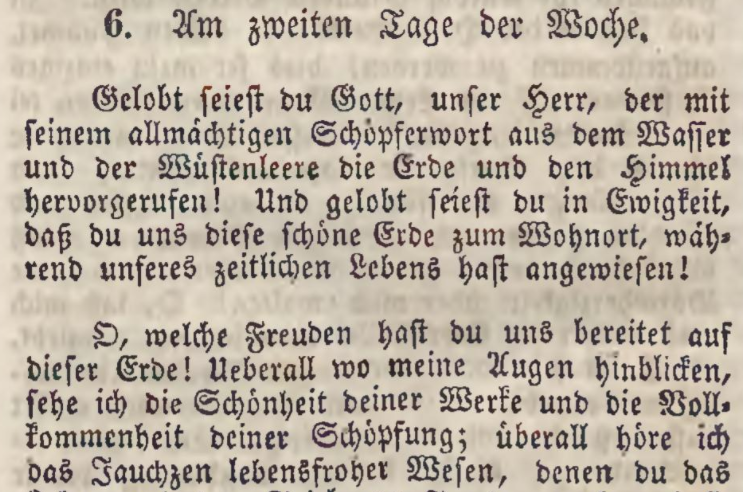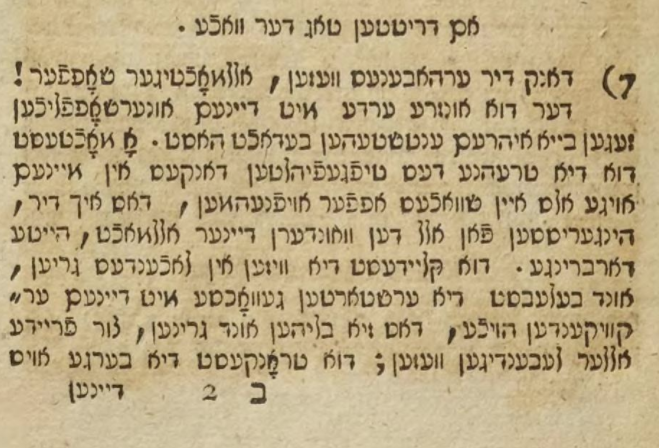| Source (German) | Translation (English) |
|---|---|
Ebenfalls für den Sabath. |
Also for the Sabbath. |
Gepriesen seyst du, allgütiger Gott, der du uns geheiliget hast durch deine Gebothe, und uns den Sabath gegeben zur Heiligung unserer Seele durch Betrachtung über deine Werke und über deine Gebote, und zur Ruhe und Erhaltung unseres Leibes nach den sechs Werktagen. |
Blessed are you, O God of all goodness, who has sanctified us by your commandments, and has given us the Sabbath for the sanctification of our souls through meditation on your works and on your commandments, and for the rest and preservation of our bodies after the six working days. |
O flöße Ruhe in unser Gemüth, Kraft in unser Herz, daß wir diesen geheiligten Tag so feiern, wie es deiner würdig ist. Oeffne deine milde Hand, und sättige uns mit Wohlgefallen, daß wir dem Sabath mit freudigem Herzen entgegen gehen und ihn würdig feiern könnten für Geist und Leib. Gieb uns Genügsamkeit und Vertrauen auf deine Gnade und Allmacht, daß der thörichte Gedanke unser Herz nicht beschleiche, daß die Ruhe am Sabath unserm Vermögenstand nachtheilig sein könnte, und wir uns nicht verleiten lassen, ihn zu entweihen, weder durch Arbeit noch durch Uebermaaß am Genuße, ohne an etwas zu denken, als an die Pflege unseres Leibes. |
O instill rest into our minds, strength into our hearts, that we may celebrate this holy day in a manner worthy of you. Open your gentle hand and fill us with good pleasure, so that we may approach the Sabbath with a joyful heart and celebrate it worthily for mind and body. Grant us simplicity and trust in your grace and omnipotence, so that the foolish thought may not creep into our hearts that resting on the Sabbath could be detrimental to our fortune, and that we may not be tempted to profane it, either by work or by excess of pleasure, without thinking of anything but the care of our bodies. |
Diese Erde, sagen unsere Weisen, gleicht den Wochentagen, jenes Leben aber gleicht dem Sabath. Laß uns den tiefen Sinn dieser Vergleichung nicht vergessen. Wie es keine Sabathfeier giebt für den, der die Woche in dumpfem Müssiggang hinbringt, so giebt es jenseits keine Seligkeit für den, der sein Erdenleben unwürdig im Müssiggang hingebracht. |
This earth, say our sages, is like the days of the week, but that life is like the Sabbath. Let us not forget the deep meaning of this comparison. Just as there is no Sabbath celebration for the one who spends the week in dull idleness, so there is no bliss beyond for the one who spends his earthly life unworthily in idleness. |
Du hast diesen Tag zur Ruhe bestimmt, und es ziemt uns schwachen Sterblichen nicht überdieß, oder über irgend etwas, was von deiner Erwählung abhängt, zu klügeln. Dieses Leben ist das Leben im Glauben, durch welches wir uns würdig machen, einst die Wunder deiner Lehre zu schauen. Ich dachte, spricht der heilige Sänger, ich will die Weisheit erlangen, aber sie ist fern von mir (Kohelet 7,23). Ich bin gerne unwissend und demüthige mich im Glauben, bis ich einst in das göttliche Heiligthum komme, da werde ich den Zweck der göttlichen Gebote erkennen. |
You have appointed this day for rest, and it does not behoove us weak mortals to mull over this or anything that depends on [understanding] your decision. This life is the life of faith by which we make ourselves worthy to behold the wonders of your teaching one day. I thought, says the holy singer, I will attain wisdom, but it is far from me (Kohelet 7:23). I am willingly unknowing and will humble myself in faith, until one day I come into the divine sanctuary; there I will know the purpose of the divine commandments. |
Laß uns nie vergessen die Worte des Propheten: Wenn am Sabath deine Füße rasten, deine Geschäfte zu verrichten, und du auch nicht von ihnen redest; wenn du den Sabath Lust der Seele nennst, geehrt dem Heiligen zu ehren. Dann wirst du dich in Gott vergnügen. Ich werde dich setzen auf die Höhen des Erdenglückes, so hat es der Ewige verheißen (Jesaja 58,13-14). Amen. |
Let us never forget the words of the prophet: When on the Sabbath you rest your feet from your business affairs, and you refrain from speaking of them either; when you call the Sabbath the delight of the soul, honored to the Holy One, then you shall delight yourself in God. I will set you on the heights of earthly happiness, so has the Eternal promised (Isaiah 58:13-14). Amen. |
“Ebenfalls für den Sabath” was included by Yehoshua Heshil Miro in his anthology of teḥinot, בית יעקב (Beit Yaaqov) Allgemeines Gebetbuch für gebildete Frauen mosaischer Religion. It first appears in the 1829 edition, תחנות Teḥinot ein Gebetbuch für gebildete Frauenzimmer mosaischer Religion as teḥinah №12 on pp. 16-17. In the 1835 and 1842 editions, it also appears as teḥinah №12 on pp. 19-20. In a note to “Gebet am Tage der Gedächtnißfeier verstorbener Eltern, an deren Grabe zu sprechen” published in the 1835 edition, Miro records that Isaak Plessner sent this prayer to him, and from this we infer that its authorship may also be attributed to him.
We welcome corrections and improvements. The transcription of the German from Latin script in Fraktur type provided machine-readable text for a machine translation by DeepL, which we then edited for accuracy and clarity. –Aharon Varady
Source(s)



“Für Sabath [№2] | For Shabbat (№2), a teḥinah by by Isaak Pleßner (1829)” is shared through the Open Siddur Project with a Creative Commons Attribution-ShareAlike 4.0 International copyleft license.



![Fürbitte für die Verstorbenen [no.2] (Yehoshua Heshil Miro 1829) - cropped](https://opensiddur.org/wp-content/uploads/2022/03/Furbitte-fur-die-Verstorbenen-no.2-Yehoshua-Heshil-Miro-1829-cropped-1.png)






Leave a Reply